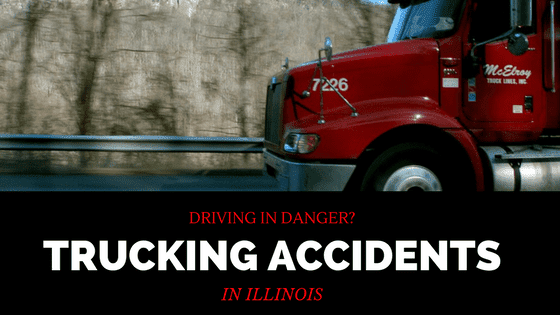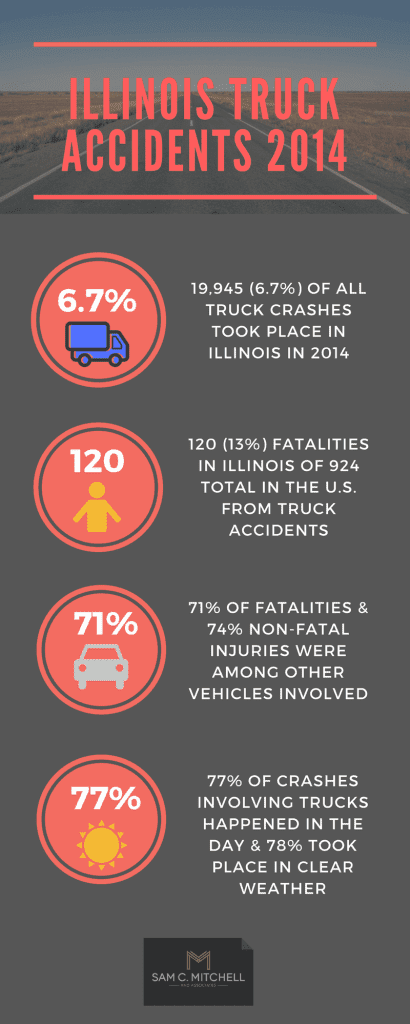Trucking Accidents In Illinois

A recent study by the American Trucking Association reported that by 2014, the transportation industry would employ 110,000 more drivers. The current shortage in skilled truckers could result in overtired and under-trained drivers, creating hazardous conditions on the road for other motor vehicle operators. Already, high turnover, maintenance, and quality issues plague the commercial trucking industry. It may only get worse, and if you have been involved in a trucking accident in Illinois, you understand what a serious issues this could become. Trucking accidents can include tractor-trailer accidents, 18-wheeler accidents, and semi-truck accidents.

The size and weight of large commercial trucks is an issue compared to passenger cars which make motor vehicle crashes involving trucks a concern for passenger safety. According to IDOT, there were 296,060 total large truck crashes in 2014.
- 19,945 crashes (6.7%) happened in Illinois
- 120 (13%) fatalities in Illinois of 924 total in the U.S.
- 71.7% of the fatalities & 74.3% of non-fatal injuries in Illinois were among those in the other vehicle involved
Driver Demographics
- 96.3% of drivers of large trucks were male
- 70.1% of all drivers were aged 25-54
Lighting Conditions & Time of Day
- 77% of crashes involving large trucks took place in the day
- 78.8% of all crashes took place in clear weather
- Most accidents happened between 7:00 a.m. and 6:00 p.m.
Road Use and Geographic Facts
- 66.1% of all crashes took place on roads or highways
- 52.8% of all crashes took place in Cook County
Common Causes Of Truck Accidents
Causes due to Passenger vehicle
Passing Unsafely
Always make sure you have enough room to pass safely. Avoid passing on hills or curves.
Changing lanes or merging in front of a semi
It takes truck drivers a longer time to stop or slow down there vehicle due to the size and weight of the truck. Swerving in front of a truck can lead to an accident. Once you put on your blinkers, many truck drivers will flash their lights to let you know it is safe to merge over into their lane.
Following Too Closely
It is never safe to follow any car too closely but especially large trucks. When you follow behind a truck and you cannot see the truck drivers view mirrors, they have no way of knowing you are there. Tailgating a truck is very dangerous.
Causes due to Commercial Truck Drivers
Truck Driver Fatigue
Scheduled routes include hundreds or more miles and can wear on a driver. There are federal regulations limits to the amount of time a truck driver can drive in a week.
Poor Truck Maintenance
Truck companies are responsible for maintaining and inspecting their trucks. These companies can be to blame in the case of a faulty equipment such as brake failures or tire blowouts which can cause the driver to lose control of the vehicle.
Unsafe Driving Practices
Some unsafe driving practices would include tailgating another vehicle, road rage, frequent and quick lane changes, failure to use turn signals and failure to check blind spots.
Texting while Driving
Truck drivers spend a lot of time on the road which can lead drivers to multitask. Texting while driving is against the law and is banned for drivers of commercial trucks. If a driver is fatigued and texting, the chances of getting into an accident are that much greater.
Speeding
Commercial trucks are usually about 20 times heavier than the average passenger vehicle. These drivers often speed because they are on such strict timelines however the chances of an accident are higher when speeding.
Other common causes of truck accidents include improper training, overloading, weather conditions, and road construction.
If you have been involved in a truck accident, you need to have an experienced lawyer represent you in your case. Our attorneys have the skills and expertise to handle complicated trucking accidents. Sam C. Mitchell & Associates has been in business since 1968 and has handled over 3,700 cases. If you have sustained injuries from a trucking accident, contact us today for a free consultation. We want to help you seek the compensation you deserve.
